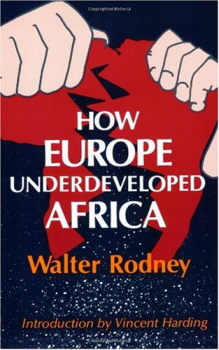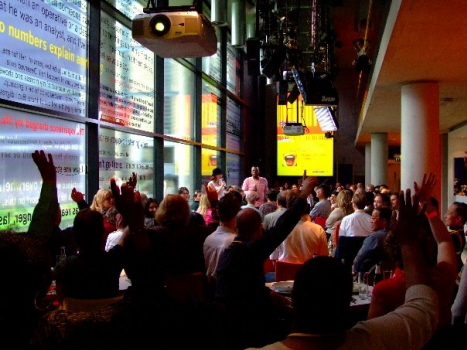Films

3 Screenings only with Q & A with director Clairemont Chung
Premiere Saturday 11 June 6.00pm-9pm
Kensington Library Theatre
Phillimore Walk, London W8 7RX
Tube: High St Kensington on District/Circle
Entry: £9.00 in advance £12.00 on the door
Advance tickets here http://www.wegottickets.com/event/120246
See trailer here http://www.youtube.com/blackhistorywalks#p/u/6/yF5PHRPe2Kc
A Rod Westmaas and www.blackhistorywalks.co.uk production. Proceeds from the screening to be donated to the Queen's College of Guyana Association (UK) which raises funds throughout the year to enrich the lives and educational experience of current students at the Queen's College of Guyana, Walter Rodney's old school.
W.A.R Stories: Walter Anthony Rodney takes a straightforward, chronological approach to Rodney's life in Guyana, Jamaica, Tanzania and England, footage of various physical locations interspersed with interviews of persons who knew and worked with him, as well as his daughter Asha. Michael O. West said that Rodney was under surveillance almost all his adult life and there were also interviews with researchers Horace Campbell and Robert Hill, among others.
Substantial treatment was given to Rodney's political activities in Guyana in the final few years of his life in which he formed the Working People's Alliance. Included in those years was his 1979 trial for arson, along with colleagues, after two government buildings were razed. Robin Small was involved in his defence.
Rodney was killed on June 13, 1980, when a bomb disguised as a walkie talkie, given to him by Sergeant Gregory Smith of the Guyana Defence Force, exploded in a car in which he was being driven by his brother Donald Rodney.
Close to the end of the documentary, there was the all too common testimony of collective amnesia, as it was said "there is so much ignorance in the country. You ask young people about Walter Rodney and they don't know".
Interviews with, Horace Campbell, Ph.D., professor of African-American Studies and Political Science at Syracuse University, Syracuse, New York; Rupert Roopnaraine, Ph.D., principal of the Critchlow Labor College, Georgetown, Guyana; Clive Thomas, Ph.D., professor of Political Science, University of Alaska Southeast; Issa Shivji, Ph.D., professor of Law, University of Dar-es-Salam, Tanzania; the late professor Haroub Othman, Ph.D., University of Dar-es-Salam, Tanzania; and the late Vice-Chancellor Emeritus Rex Nettleford, Ph.D., professor of Cultural Studies, University of the West Indies, at Mona, Jamaica. Also included among the list of those interviewed were poets, U.S. poet and playwright Amiri Baraka and Working Peoples Alliance (WPA) member Eusi Kwayana, writers, and activists including, Karen DeSouza and Andaiye, members of the WPA, the political party in Guyana to which Rodney belonged. Manning Marable Malcolm X biographer ,Asha Rodney (daughter) and Donald Rodney (brother)


Fibroids and Women of African descent.
Thursday 2 June 7-9pm (arrive early)
Science Museums Dana Centre , Science Museum,165 Queens Gate, London SW5:
Tube: South Kensington/Gloucester Roadon District/Circle.Piccadilly line
Entry: Free only if you book in advance over 18's only
0207 942 4040 or This email address is being protected from spambots. You need JavaScript enabled to view it.
www.danacentre.org.uk event arranged by www.blackhistorywalks.co.uk
Plus Q &A. Black women are more likely to suffer from fibroids and they find that they are often referred to hysterectomy (removal of the womb) as the only option. Following on from our Breast Cancer events by popular demand we present a session on Fibroids: issues and options. Date and time to be announced. This email address is being protected from spambots. You need JavaScript enabled to view it.
Uterine fibroids (singular Uterine Fibroma) are benign tumors which grow from the muscle layers of the uterus. They are the most common benign neoplasm in females. Often asymptomatic, they cause symptoms in about 25% of white and 50% of black women [1]. Uterine fibroids often do not require treatment, but when they are problematic, they may be treated surgically or with medication — possible interventions include a hysterectomy, hormonal therapy, a myomectomy, or uterine artery embolization. Estrogen receptors on uterine fibroids cause fibroids to be larger in reproductive years and shrink dramatically in size after a woman passes through menopause. Uterine fibroids are more common in overweight women and women of African descent.
At one time it was standard procedure to recommend hysteroctomy (removal of the womb) but there are other treatments. We will hear experiences of women who had fibroids and dealt with them viasurgery. We will also hear from a woman who got rid of a 10lb fibroid by dieting and from a consultant gynaecologist.The Dana Centre is open only to those aged 18 or over. Arrive early to get your seat. The cafe will be open
